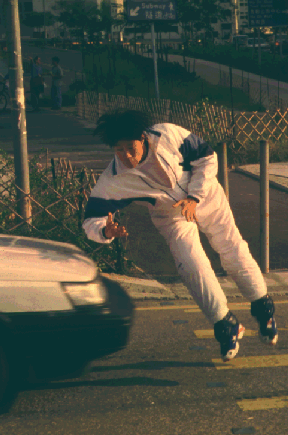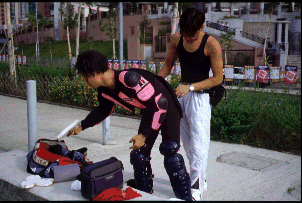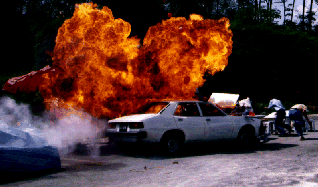 Gamble with fate
Gamble with fateMovie stunt men are the heros behind the pretty faces



 Gamble with fate
Gamble with fate
Movie stunt men are the heros behind the pretty faces

A stand-in is a person who takes the part of an actor for some movie scenes.
In dangerous scenes, actors usually request stand-ins to replace them. Stand-ins who specialize in dangerous scenes are called stunt men. There are stunt women also, but not very many. In fact, men usually do the stunts for female actors.
Though the personal safety of stunt men is put at risk, their contributions to the films are rarely recognised by audience.
 “The production of a film depends not only on actors and actresses but a whole team. Everyone has his own duty,” said Mr. Ng
Sai Hung, 37, who has been a stunt man for about five years.
“The production of a film depends not only on actors and actresses but a whole team. Everyone has his own duty,” said Mr. Ng
Sai Hung, 37, who has been a stunt man for about five years.
“I don’t feel bad as a stunt man. On the contrary, I enjoy the feeling of success and appreciation from my colleagues after having finished certain dangerous scenes,” said Mr. Ng.
According to Mr. Ng, the wage of a stunt man in a film is around $2,500 per day, and even more for specially risky scenes like car crashes or explosions.
Despite the attractive salary, it is tough to lead a comfortable life as a stunt man.
According to Mr. Ng, stand-ins do not have job orders regularly. Worse still, in addition to the decline of local movie industry, they are facing keen
 Above: Stunt men in actions.
Above: Stunt men in actions.
competition from imported labour. Stand-ins from China are much cheaper and braver.
“Nearly all of the Chinese stand-ins received professional training in kung fu. They are willing to take part in extremely dangerous scenes for low pay,” he said.
Meanwhile, the use of computer graphics in creating dangerous scenes also cuts into their earnings.
“For example, it’s easy to create the scene of a man falling from a building with the aid of computer. All you have to do is to produce a background picture, say a building, plus a series of falling motions of the actor. After combining the two pictures together, the desired action will appear on the screen without really acting it out,” said Mr. Ng.
Yet, Mr. Yuen Tak, an action director, disagreed. Said he: “The demand for stand-ins is increasing. Stand-ins are more dedicated than before. They realize that the whole production will be halted and the production costs increase inevitably if they are injured when the film is still in production. This may further burden the producer at a dormant time for the industry.”
 Responded Mr. Ng: “Of course, many young people are attracted by the high wage and the exotic job nature.
Responded Mr. Ng: “Of course, many young people are attracted by the high wage and the exotic job nature.
“However, when they encounter some extremely dangerous and risky scenes, they seldom accept the jobs. We, the older and more experienced ones, usually take up the jobs in the end,” Mr. Ng said.
To be a qualified stunt man, one has to be a good at kung fu. It would be better if they have the knowledge of car racing or motorcycling. These skills are useful in many dangerous scenes.
Apart from dangerous scenes, Hong Kong stand-ins are also required to dance or perform in nude scenes.
“The number of female stand-ins is dropping. Most of them, like Miss Lee Choi Fung and Miss Yeung Pan Pan, have become regular actresses.
 “At present, replacements of actresses in risky scenes are always taken up by male stand-ins,” said Mr. Yuen.
“At present, replacements of actresses in risky scenes are always taken up by male stand-ins,” said Mr. Yuen.
Talking about his most unforgettable experience, Mr. Ng recounted, “Once I rode a motorcycle and jumped from a cliff some three storeys high. The motorcycle exploded a little bit earlier than originally planned. Meanwhile, all the three wires tied around my waist broke.
“The lowest part of my spinal cord was badly hurt and I was
 Above: "Stand-in" in fire.
Above: "Stand-in" in fire.
paralysed from the waist down.
“Indeed, if we make sufficient safety precautions beforehand, performing dangerous actions is not as risky as what most people think. Accidents happen only when things are not well-prepared.
“I do not regret being a stunt man despite its constant threat upon my life and discontent from my family and girlfriend. The job gives me pride, joy and money that can’t be obtained from other careers with my educational level.
“Certainly, it would be more encouraging if the reward was proportional to our contributions,” said Mr. Ng.
This view is shared by movie-goer Leung Lap Shun: “I really appreciate the bravery of stunt men. They perform most of the difficult, frightening and risky scenes even though their fame and efforts are always overshadowed by those of actors.
Another movie-goer, Miss Yu Mei Po, disagreed that stand-ins should deserve special respect merely because of their dangerous job nature.
“They chose the career and so they should bear their responsibilities, even it is dangerous,” she said.
Mr. Yuen is optimistic about the future of this career.
“Action film is still the mainstream in Hong Kong. It is also welcomed by overseas markets. While Western movies are good at
advanced technology like Jurassic Park or Terminator, local films are famous for their great variety of action,” he concluded.


